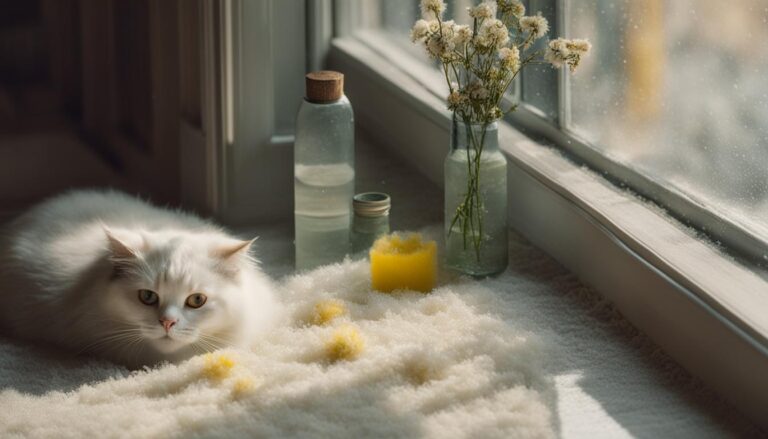Are you struggling with the unpleasant odor of cat urine in your home? Wondering how to get rid of cat pee smell and eliminate that lingering stench? Look no further! In this article, we will provide you with effective tips and solutions to tackle this issue head-on.
Understanding why your cat is peeing outside the litter box is crucial in resolving the problem. Medical problems, behavior issues, and environmental factors can all contribute to this behavior. It’s important to address the underlying cause before tackling the odor.
To effectively eliminate cat pee smell, it is recommended to clean up the urine as soon as possible. Use paper towel or cloth to absorb as much as you can. Remember, the quicker you act, the better the results.
When cleaning, use cold water as heat can make the stain and odor more difficult to remove. Avoid using ammonia-based cleaners as they can encourage your cat to urinate in the same spot.
Instead, try using enzyme cleaners, baking soda and white vinegar, or a mixture of detergent and club soda. These home remedies have proven to be effective in neutralizing and eliminating cat urine odor.
It’s also important not to punish your cat for this behavior. Instead, focus on addressing any behavioral or medical issues that may be contributing to the problem. Consult with a veterinarian if necessary.
Punti di forza:
- Understanding the underlying reasons for your cat’s inappropriate urination is crucial in effectively eliminating the pee smell.
- Act quickly and clean up the urine using paper towel or cloth.
- Use cold water for cleaning and avoid using ammonia-based cleaners.
- Enzyme cleaners, baking soda and white vinegar, and detergent and club soda are effective home remedies for removing cat urine odor.
- Avoid punishing your cat and instead focus on addressing any behavioral or medical issues.
Understanding Why Cats Pee in the House
Cats may pee in the house due to various reasons, such as medical problems, behavior issues, or environmental factors. Medical problems like diabetes, kidney disease, or urinary tract issues can cause cats to urinate outside the litter box. Behavior issues such as stress and anxiety can also contribute to inappropriate urination. Additionally, cats may engage in territorial spraying to mark their territory. In multi-cat households, cats are more likely to develop urinary issues due to competition or stress.
To prevent cats from peeing in the house, it’s important to address these underlying issues. Firstly, ensure that your cat has access to a clean litter box at all times. Cats prefer a clean environment and may avoid using a dirty litter box. Regularly clean the litter box and change the litter to maintain cleanliness. If you have multiple cats, provide enough litter boxes to avoid overcrowding and ensure each cat has a separate space.
In addition to a clean litter box, it’s crucial to address any medical or behavioral issues that may be causing your cat to urinate inappropriately. If you suspect a medical problem, consult with your veterinarian for proper diagnosis and treatment. For behavior issues, consider implementing measures to reduce stress and anxiety, such as creating a calm and comfortable environment for your cat. Providing enrichment activities and ensuring they have enough personal space can also help alleviate stress.
By understanding the reasons behind cats peeing in the house and taking appropriate steps to address them, you can effectively prevent this behavior and create a harmonious living environment for both you and your feline companion.
Table: Environmental Factors Contributing to Cats Peeing in the House
| Environmental Factor | Effect |
|---|---|
| Dirty litter box | Cats may avoid using a dirty litter box and choose to pee elsewhere. |
| Competition in multi-cat households | Cats may develop urinary issues due to territorial disputes or stress caused by other cats. |
| Changes in the household | Moving to a new home or introducing new pets can cause stress and lead to inappropriate urination. |
| Lack of personal space | Cats need their own space where they feel safe and secure. Without it, they may exhibit inappropriate urination. |
| Stress and anxiety | Environmental factors like loud noises, changes in routine, or the presence of unfamiliar people can trigger stress and anxiety, leading to inappropriate urination. |
Understanding and addressing these environmental factors can help prevent cats from peeing in the house. By creating a clean and stress-free environment for your cat, you can promote proper litter box usage and eliminate the issue of inappropriate urination.
Tips for Removing Cat Pee Smell
To effectively remove cat pee smell, it’s important to take prompt action and use the right techniques. Here are some tips to help you eliminate that unpleasant odor:
- Timing is key: Clean up the urine as soon as possible to prevent bacteria growth and odor penetration.
- Soak it up: Use paper towels or cloth to absorb as much urine as you can. Press down firmly to ensure thorough absorption.
- Keep cool: Avoid using hot water for cleaning, as it can set the stain and make the smell more difficult to remove. Instead, use cold water.
- Avoid ammonia: Steer clear of ammonia-based cleaners. The smell of ammonia resembles cat urine, which can attract your cat to the same spot.
- Don’t punish your cat: Punishing your cat for urinating outside the litter box can lead to stress and further behavioral issues.
- Enzyme cleaners: These cleaners are specifically designed to break down the proteins in cat urine, effectively neutralizing the smell.
- Baking soda and white vinegar: Mix equal parts of baking soda and white vinegar to create a powerful odor-busting solution. Apply it to the affected area and let it sit for a while before blotting it dry.
- Detergent and club soda: Create a mixture of detergent and club soda, and use it to scrub the stained area. Rinse with cold water and pat dry.
By following these tips and using the right cleaning methods, you can successfully remove cat pee smell from your home.
Why Enzyme Cleaners Work
Enzyme cleaners are highly effective in removing cat pee smell because they contain enzymes that break down the proteins in urine. These enzymes neutralize the odor and help eliminate any traces of the urine, preventing your cat from being attracted to the same spot again. It’s important to note that enzyme cleaners work best when used as directed and given enough time to fully break down the urine proteins.
Homemade Remedies for Removing Cat Pee Smell
If you prefer using natural and homemade remedies, baking soda and white vinegar can be highly effective in eliminating cat pee odor. Baking soda helps absorb the odor, while white vinegar acts as a natural disinfectant. Simply mix equal parts baking soda and white vinegar, apply it to the affected area, and let it sit for some time before rinsing and blotting it dry. Repeat the process if necessary. You can also use a mixture of detergent and club soda to scrub the stain and remove the smell.
| Cleaning Method | Ingredients | Instructions |
|---|---|---|
| Baking Soda and White Vinegar | Equal parts baking soda and white vinegar | Mix the ingredients to form a paste. Apply it to the affected area and let it sit for a few minutes. Rinse with cold water and blot dry. |
| Detergent and Club Soda | 1 part detergent, 2 parts club soda | Mix the detergent and club soda to form a cleaning solution. Scrub the stained area with the solution, then rinse with cold water and pat dry. |
How to Prevent Cats from Peeing in the House
If you’re dealing with the frustrating problem of a cat peeing in your house, there are steps you can take to prevent this behavior and maintain a clean environment. Here are some effective strategies:
1. Schedule a Veterinary Visit
Before implementing any preventive measures, it’s important to rule out any underlying medical issues that may be causing your cat to urinate inappropriately. Schedule a visit with your veterinarian to ensure your cat is healthy and free from any conditions that could be contributing to the behavior.
2. Keep a Clean Litter Box
Cats are very particular about their bathroom habits. Ensure that your cat has access to a clean litter box at all times. Scoop the litter box daily and change the litter regularly. Consider using unscented litter, as some cats may be sensitive to strong fragrances.
3. Retraining and Extra Litter Boxes
If your cat has already developed a preference for urinating in certain areas of your home, it may be necessary to retrain them to use the litter box. Confine your cat to a small area with a litter box until they consistently use it. You can gradually expand their access to the rest of the house once they demonstrate good litter box habits. Additionally, adding extra litter boxes in different areas of your home can provide more options for your cat and reduce the likelihood of accidents.
4. Consider Dog-Training Urine Pads
In some cases, using dog-training urine pads under the litter box can help prevent accidents and make cleanup easier. These pads are designed to absorb and neutralize odors, providing an additional layer of protection for your floors.
Table: Comparison of Preventive Measures
| Preventive Measures | Effectiveness | Key Benefits |
|---|---|---|
| Schedule a Veterinary Visit | Essential | Identify and address any underlying medical issues |
| Keep a Clean Litter Box | Highly effective | Encourages proper litter box usage |
| Retraining and Extra Litter Boxes | Variable | Helps redirect cat’s behavior and provides additional litter box options |
| Consider Dog-Training Urine Pads | Supplemental | Provides an extra layer of protection for floors |
By following these preventive measures, you can effectively stop your cat from peeing in the house and create a clean and harmonious living environment for both you and your feline companion.
Conclusione
Understanding how to effectively remove cat pee smell is essential for maintaining a clean and comfortable home. By addressing the underlying reasons for inappropriate urination and following the tips and solutions mentioned in this article, you can successfully eliminate cat urine odor.
Remember to provide a clean litter box, address any medical or behavioral issues, and use appropriate cleaning products to neutralise the smell. With patience and consistency, you can create a happy and odour-free environment for both you and your cat.
So, next time you are faced with the unpleasant task of dealing with cat pee smell, don’t panic. Armed with the knowledge and techniques shared in this article, you can confidently tackle the problem and restore freshness to your home.




